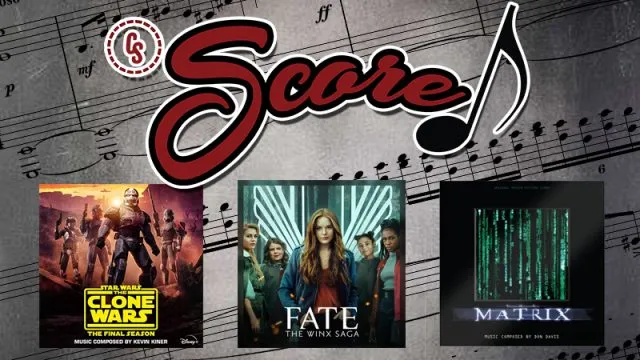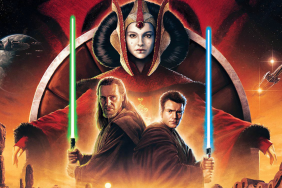Hey there, film score lovers! You’re probably thinking, ‘What?! Two CS Scores in less than a week?’ Well, that’s because we’ve got a couple of awesome pieces for you to check out, including and awesome interview with The Clone Wars and The Bad Batch composer Kevin Kiner, who received an Emmy nomination for his work on the final episode of Clone Wars, titled “Victory and Death.”
We also speak with Anne Nikitin about her work on Netflix’s Fate: The Winx Saga, in which she discusses the challenges of crafting a modern day fantasy score.
Let’s do this thing!
NEWS
Varèse Sarabande Records will be releasing seven amazing soundtrack LPs on Record Store Day 2021’s newly announced release dates:
The Matrix will be released as a deluxe 3-LP set, Village of the Damned will be released as a deluxe-edition double LP, The Iron Giant and The Goonies will get the picture disc treatment, and Shrek, Ghosts of Mars, and Aliens will be released as limited-edition color LPs. This annual celebration will be held through a series of Record Store Day drops, which will occur on June 12th and July 17th.
These seven Varèse Sarabande Records titles will be available on the dates listed below at thousands of independent record stores. For a list of participating stores and more information about these special LPs, visit RecordStoreDay.com.
*JUNE 12th: The Matrix, The Goonies, Village of the Damned, Shrek
*JULY 17th: The Iron Giant, Ghosts of Mars, Aliens
THE MATRIX: The Complete Edition – Don Davis (3-LP Set) – *RELEASE DATE: JUNE 12th*
The science-fiction masterpiece has captured the imagination of another generation with news of a new Matrix film in production. This deluxe 3-LP set is pressed on Glitter-Infused Green vinyl, expanded to 44 tracks, and housed in a stunning new art design. Also included are classic film stills and an exclusive new interview with composer Don Davis.
*Music download not available until June 12th
THE GOONIES – David Grusin (Picture Disc) – *RELEASE DATE: JUNE 12TH*
In celebration of the 35th anniversary of The Goonies, the beloved soundtrack by Dave Grusin will be released on an LP picture disc for the first time ever! The special release features the album cover on side A and the infamous One-Eyed Willie on side B. The track listing to this abbreviated single-disc version of the original score was personally selected and assembled by Grusin himself.
VILLAGE OF THE DAMNED: The Deluxe Edition – John Carpenter & Dave Davies (2-LP Set) – *RELEASE DATE: JUNE 12TH*
The Deluxe Edition for Village of the Damned presents the full score as heard in the film for the first time, a far more complete presentation than the 1995 Original Soundtrack which was not only truncated but made of an entirely separate mix that wasn’t featured in the film. The set does, however, include the track “Midwich Shuffle,” a fun number which was created specifically for the 1995 soundtrack, despite never actually appearing in the film. Interest in John Carpenter’s original film scores has never been higher, and his collaboration with Dave Davies of the Kinks is a one-of-a-kind moment in cinematic music history. The album includes all-new original art direction with new notes and classic film stills and comes pressed on Orange Haze vinyl.
SHREK – Harry Gregson-Williams & John Powell (Limited-Edition Color LP) – *RELEASE DATE: JUNE 12TH*
Shrek is the second most successful animated franchise in history and celebrating its 20th anniversary in 2021. Harry Gregson-Williams and John Powell are two of the most prominent composers working on animated features today, and they joined forces to create a score that is still as fun and memorable as it was when it was first released. The LP will be released on Neon Green vinyl, making it a standout addition to any record lover’s collection.
THE IRON GIANT – Michael Kamen (Picture Disc) – *RELEASE DATE: JULY 17TH*
This first-ever picture disc of this heartwarming 1999 animated film celebrates The Robot, his best friend, Hogarth, and a cast of characters. The music is by Academy Award®-nominated composer Michael Kamen (Lethal Weapon, Die Hard), who was well-known for his work with Eric Clapton, Metallica and Pink Floyd, in addition to his brilliant theatrical scores.
GHOSTS OF MARS – John Carpenter (Limited-Edition Color LP) – *RELEASE DATE: JULY 17TH*
In celebration of Ghosts of Mars’ 20th anniversary, the epic soundtrack will be released on “Red Planet” vinyl. John Carpenter recruited an unbelievable cast of musicians to record the soundtrack to this sci-fi horror film, starring Ice Cube and Natasha Henstridge. Among the featured players are GRAMMY®-winning musician Steve Vai, most of the heavy metal band Anthrax (including Scott Ian), Elliot Eason of the rock band The Cars, Buckethead of Guns N’ Roses, and Robin Finck of Nine Inch Nails and Guns N’ Roses. This soundtrack is apocalyptic and an important mark in John Carpenter’s unparalleled career as a director and composer.
Aliens is regarded as one of the greatest science fiction franchises of all-time. In honor of its 35th anniversary, the long out-of-print original soundtrack gets a fresh reboot on Acid-Blood Yellow-Green vinyl. The soundtrack is scored by the great Academy Award®-winning composer James Horner (Titanic, Avatar, Beautiful Mind). The LP features the original Sigourney Weaver key art and original film stills.
New Intrada Release COMPANY BUSINESS Expanded 2-CD reissue of gritty Michael Kamen action score! https://t.co/IDvyrvpyXT
— Intrada (@IntradaCDs) April 5, 2021
Back in stock STAR TREK V: THE FINAL FRONTIER (2CD). https://t.co/YFQ8wlDAdz
— Intrada (@IntradaCDs) April 5, 2021
Our expanded/remastered #MissionImpossible 2-CD #Soundtrack by #DannyElfman is back in stock! Get it NOW at https://t.co/M4LZNDtqCp for 25% OFF as part of our site-wide 25% OFF YOUR ENTIRE PURCHASE spring sale. Runs thru 4/20. #TomCruise #90s pic.twitter.com/W6RYRVtERx
— La-La Land Records (@LaLaLandRecords) April 6, 2021
The #JohnWilliams Disaster Movie #Soundtrack Collection (4-CD SET) is back in stock! Get it NOW at https://t.co/M4LZNDtqCp for 25% OFF as part of our site-wide 25% OFF YOUR ENTIRE PURCHASE spring sale. Runs thru 4/20. pic.twitter.com/TDMHqHYamX
— La-La Land Records (@LaLaLandRecords) April 6, 2021
It’s official! #Ghostbusters 2 film score releasing this summer!: https://t.co/JIxBHKQxyA pic.twitter.com/9IhcLE2KqG
— Ghostbusters News (@GBNewsdotcom) April 6, 2021
Kevin Kiner Interview
The Clone Wars

Kevin Kiner recently received an Annie Award-nomination and a Daytime Emmy nomination for his score for the series finale of Star Wars: The Clone Wars titled “Victory and Death.”
It may sound surprising, but Kiner has written more music for Star Wars than any other composer ––
The Clone Wars – 7 Seasons, 133 episodes, plus an animated feature
Rebels – 4 Seasons, 75 episodes
The Bad Batch – 1 Season (so far)
Kiner has previously been nominated for the Primetime Emmys, Daytime Emmys, and Annie Awards for his work on The Clone Wars and Rebels.
Since 2008, Kiner’s music has transported audiences to “a galaxy far, far away” and brought emotional resonance to the intergalactic adventures of Anakin Skywalker, Obi-Wan Kenobi, and fan favorite Ahsoka Tano.
RELATED: New Star Wars: The Bad Batch Trailer for Disney+ Animated Series
For The Clone Wars – The Final Season, Kiner took a huge departure from the typical orchestral music Star Wars is known for, using almost exclusively synths to score some of the season’s most emotional moments – a delicate balance between connecting his music to the previous seasons while also pushing boundaries and paving the way for new sounds and new styles – expanding how we define the music of Star Wars.
Kiner has also worked on CSI: Miami, Narcos: Mexico, Titans, Doom Patrol, and the Stuart Little TV series, among other projects.
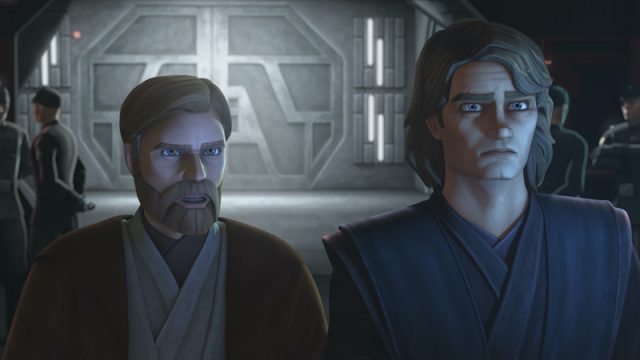
CS: You’re nominated for an Annie Award for the final episode of The Clone Wars. What’s it like to receive such an honor for your work?
It’s just spectacular! And I wish we didn’t have to have a winners and losers. Part of my speech is always going to be — I haven’t won, or anything — but it was always going to be, ‘If you were in this category with me, you’re a really good composer, because composing for animation is the most difficult job I’ve ever had in my life. And I’ve written a lot of live action. For animation, you have to be a good composer to pull it off.
CS: What makes animation so difficult?
Kiner: It changes a little more often. Now, that’s starting to be less and less, especially with Bad Batch and especially the last season of Clone Wars, where much of the music was very similar to a feature film in terms of it just kind of grew; and didn’t have to change with every motion of every character and didn’t have to be quite as tight. I would take the extreme of animation, which would be the Looney Tunes kind of thing or things I did when I did the Harold and the Purple Crayon or Stuart Little — well, that’s just hard as heck because every 10 seconds or every five seconds, you’re going a different direction. You have to write a whole new tune, you know? So, a lot more work. You’re writing a lot more ideas; you have to come up with a lot more ideas.
ComingSoon.net: How did you land such an amazing gig with the Clone Wars?
Kevin Kiner: It was an audition process for and I’m still not sure you know why I was one of the five guys or four guys who audition for it. I think that George liked the music to CSI: Miami. I know he was trying to push the envelope. And we did very cutting-edge electronic music for CSI: Miami in those days, so, possibly, that’s why. But then I got the gig after the audition. And then I got to meet George Lucas. I didn’t meet him beforehand. I had met Dave Filoni and he kind of gave me the marching orders or the sketch of what they were looking for, for the audition piece. But then after I got the gig, I met George Lucas. And, you know, that was obviously a dream, because I had grown up watching Star Wars and I was a huge fan of John Williams and his music as well.
CS: Did you see The Clone Wars as something that would have such a huge impact on pop culture?
Kiner: I knew it was gonna be really good. And, I mean, you can never foresee how long of a run something’s gonna have. I think that I didn’t foresee. If you’d asked me back then I would have said, ‘Probably, it’ll go for four years,’ something like that. So, I definitely didn’t foresee the longevity. But who could foresee what Disney has done with the Star Wars property as well? I think it’s pretty clear that they know what they’re doing. So, nobody would have seen that. And you look at the success of things like The Mandalorian, as well as The Clone Wars and a lot of that — even though Disney wasn’t initially involved in Clone Wars, but they were involved in season seven and bringing it back for the fans. I mean, that’s really listening to your fans. You got to give them props for that. A lot of people get down on large corporations or big companies like that, and sometimes it’s rightfully so. But I think Disney’s really listened to the fans and brought Clone Wars back to be finished.
CS: What prompted the change in music over the final season of The Clone Wars?
Kiner: Well, the world had changed, the zeitgeist had changed. We had things like Game of Thrones and Westworld and I started working on Titans and Doom Patrol, and that got me all into the electronic thing. I started working with my sons. And they were really into electronic music as well. Also, it was an evolution. I’m sure if you go from the first year or season of Clone Wars music and then you go to the very last episode, there’s a drastic change. But if you go through Clone Wars, and then go through Rebels and then back to Clone Wars, there’s less of a drastic change. Yes, it continues to grow and continues to be different. But, you know, the change isn’t as drastic if you go along the timeline.
And the other answer to that question is that Filoni has a big impact. And he was really getting into electronic scores and what was happening in the world and the zeitgeist, like I said, of our day, and of cinema and music for cinema.
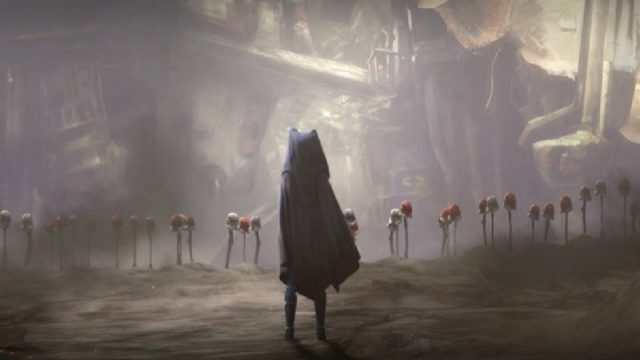
CS: One of the big moments for season seven is the final scene with Ahsoka discarding her lightsaber, which is then found much later by Darth Vader. What led you to score the scene in the manner that you did?
Kiner: Dave Filoni was at the forefront of choosing that kind of sound and telling us that he wanted it scored that way. That said, I thought at the time, it was a huge risk. Because, you know, Star Wars music had not gone that far outside of the orchestra realm before. My sons co-write a lot of these with me, and one of them said the other day that when they saw The Mandalorian they were really relieved, because it was like, yeah, you can do different things in Star Wars. And it’s okay. And we just finished [season seven] when Mandalorian came out and there was a little apprehension of whether going that electronic in Star Wars, whether it was okay or not to do that. Now, again, we were pretty strategic and that music at the end is still very large in scope. It’s extremely dramatic. That’s a hallmark — those two things I just said, the large nested scope and the drama and the seriousness of it — those are hallmarks of Star Wars music in general. So, we did go electronic, but we stay within a lot of the milieu of Star Wars music and the feel and the cinematic scope, even though it was electronic. Dave was really into that. So, it’s really cool to work with somebody that closely who’s really into stretching things.
CS: Have you ever been approached to score a Star Wars film?
Kiner: So, the answer is no, I have not been approached to do any of that. I hear rumblings every once in a while, but that’s probably more fans than anything. Of course, I would love to score a feature film. I would also love to do exactly what I do. And, you know, I’m writing for The Bad Batch currently, and to have written all of The Clone Wars and Rebels … it’s an extreme honor and it’s also been a lot of fun. You know, these days — someone just asked me which television shows that I watch and my favorite movies, and I had to go back to Grand Budapest Cafe to find a favorite movie. I just really like TV shows these days. I mean, I mentioned Game of Thrones and the first season of Westworld. There’s a show called Devs, Mr. Robot — all these great shows that I personally watch. And I’m not feeling that from feature films as much these days. I think Clone Wars stands up there with anything and it’s a great, great privilege to be part of that.
Anne Nikitin Interview
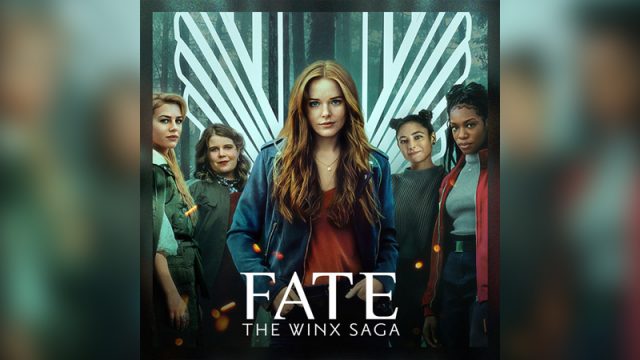
Anne Nikitin is an Ivor Novello and Emmy-nominated composer who has worked on projects such as Bart Layton’s critically acclaimed heist movie American Animals and BAFTA-winning film The Imposter, Sky Atlantic’s Little Birds, the BBC/Amazon Prime series The Pale Horse, and Stardust, starring Johnny Flynn with whom she co-composed part of the score.
Fate: The Winx Saga is a six-episode coming-of-age series which follows the story of five unlikely friends attending Alfea, a magical boarding school in the Otherworld where they must learn to master their magical powers while navigating love, rivalries and the monsters that threaten their very existence.
The live-action series stars Abigail Cowen (Chilling Adventures of Sabrina) as Bloom, Hannah van der Westhuysen as Stella, Precious Mustapha as Aisha, Eliot Salt (Normal People) as Terra, Elisha Applebaum as Musa, and Sadie Soverall as Beatrix.
Fate: The Winx Saga is executive produced by Brian Young (The Vampire Diaries, Kyle XY), Iginio Straffi, and Archery Pictures’ Judy Counihan and Kris Thykier.
Season one of the series is currently streaming on Netflix.
ComingSoon.net: What drew you to Fate: The Winx Saga?
Anne Nikitin: So, basically, I was introduced to the creator, Brian Young, by the music supervisor, who I worked with before on another project. And Brian and I clicked, we hit it off really well. I wrote some music for him, which he really liked. And that was it. And I was really excited to hear about this project because I love dark, magical fantasy. And I thought I could have a lot of fun with the score on this one.
CS: What were some of the challenges presented by the series, because here’s a lot of emotional teenage drama to go with the magical elements?
Nikitin: Well, basically, we decided early on that we didn’t want a huge orchestral score, we wanted it to be quite intimate, but also to have a lot of power when we needed. We needed that for some of the magical scenes and some of the chase scenes. We also wanted to have a lot of emotional tenderness and tension as well. And a feeling of magic, of course, and a feeling of being an otherworldly place. And yet also something that typical teenagers and young adults can relate to, in our world. So, I tried to fuse classical strings and harp for the magical effects; and for the more emotional effects, use more urban, contemporary edgy beats.
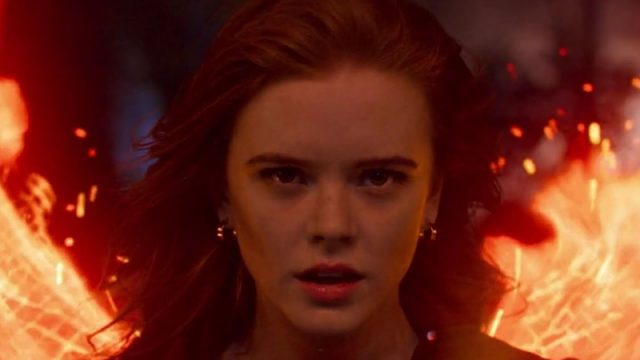
CS: One of my favorite cues is in episode six when Bloom finally unleashes her powers. The music is very powerful, but also filled with, as you said, urban beats. Is that an early sequence you started on, or did you begin writing on a different scene?
Nikitin: I didn’t see the transformation for a long time. And that was a scene where they were toying with commercial music and score music. And I ended up being a combination of the two. But a lot of my early sketches for the show had already combined elements of strings and the harp with the synth sound, because — from what I was told — it was gonna have to be a modern contemporary feel. And I also wanted to make sure that my music complimented a lot of commercial tracks that they use. They wanted to use very, very contemporary commercial tracks, and I didn’t want my music to stick out as something that didn’t quite fit into that world. So, I had to make sure that it sort of matched in that way.
CS: What is the process of scoring for a TV series? And when do you stop tinkering with the score?
Nikitin: Well, a solid deadline will help you stop tinkering [laughs]. Luckily, on the show, I was brought on board very early in the process. It was really nice because I did have time to tinker. Sometimes you really got to bust them out to meet the deadlines and it’s hit or miss with whether you can become proud of the music you’ve written when it’s such a rush rush job. But with this one, we had time to experiment. And I worked very closely with Brian, the creator, to make sure that we were on the same page with the music and how the score should sound. Luckily, we were, but it did take some trial and error to get there, especially on episode one. And then of course, Netflix also wanted to hear the score I’d written episode one, and had some notes as well. Everybody has to be happy. It’s not just me, it has to complement the vision of the Creator as well.
CS: How much freedom do you have on each TV show?
Nikitin: It changes from show to show. On this show, I felt like I had a lot of freedom. And it was so fun, because I felt that Brian had entrusted me with his baby, to create something for him. And he really liked what I did. And a lot of the guide music that they had in there wasn’t working for the show, which was good for me because it meant that I could come in with a fresh approach and a clean slate; and really just try and create a world that felt like me, but that could please, Brian, as well.
RELATED: Fate: The Winx Saga Trailer Preview Netflix’s Newest Teen Fantasy Series
CS: What was your favorite aspect of this score that you’re excited for audiences to hear?
Nikitin: I really love all the sort of magical elements. When the main character is trying to learn her magic — or trying to control her magic, I should say — I really loved writing for those moments. They were quite magical. They could be powerful. They were tender and sensitive at times. And I really enjoyed working those things.
CS: Were there any concepts or ideas that you had in season one that that you’re planning to expand upon for season two?
Nikitin: I wouldn’t normally shelve anything for next season, because I’m so concentrated on getting season one out of the door. But there are a few tracks where Brian really loved them but they just weren’t fitting here, and he would say, ‘Let’s put them in the bank for season two.’ We really think we’re going to find a place for them there. So that was quite an easel actually. But, you know, it didn’t happen very often. But I’ve got a couple of little things that I might try and pull out.
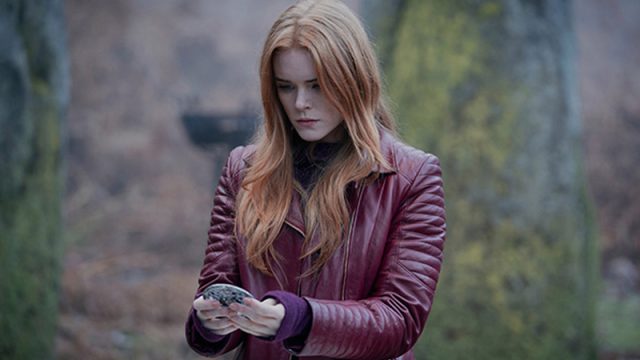
CS: Can you tell us a little bit about your career? What got you into the music industry and onto this career path?
Nikitin: Yeah, sure. So, I’ve always loved music, and I’ve always wanted to write music since I can remember. I started off as a classical composer, and I should say, contemporary music. And then I realized that my passion was with film music, because I’ve always loved books. I’ve got a degree in English, and I really wanted to marry music with storytelling. And I thought film music was the right way to do it, and to sort of express myself as a musician. And I studied film music, and then just really waited patiently until I was able to earn my first job. It took a while. It took a lot of hard work; lots of long nights writing short films, scoring short films and getting to know people in the industry. But it’s really happened.
CS: How do you think you’ve evolved as composer since the first job that you’ve had?
Nikitin: I think my very first job, I knew nothing really about the process. And I was very shy. And I felt privileged to be writing music for somebody who was actually going to pay me to do it, and it was going to be on film and television. And, of course, I still feel privileged to be doing this for a living. I think I’m in a very, very lucky position. But I feel a lot more confident now. Back then I would be worried about speaking out with the director and telling them what I thought. I would always be the sort of ‘yes’ person. And of course, I’m still the ‘yes’ person — you still have to be flexible like that. But I’m definitely more confident in giving my opinion and discussing the project as more of a collaboration. But I think that comes with any sort of profession, as you grow into it you become more confident.
